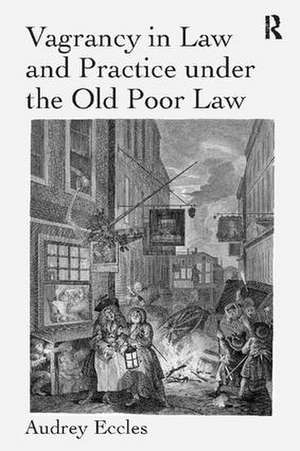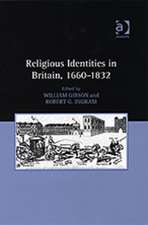Vagrancy in Law and Practice under the Old Poor Law
Autor Audrey Ecclesen Limba Engleză Paperback – 24 mai 2017
| Toate formatele și edițiile | Preț | Express |
|---|---|---|
| Paperback (1) | 299.05 lei 6-8 săpt. | |
| Taylor & Francis – 24 mai 2017 | 299.05 lei 6-8 săpt. | |
| Hardback (1) | 821.90 lei 6-8 săpt. | |
| Taylor & Francis – 18 oct 2012 | 821.90 lei 6-8 săpt. |
Preț: 299.05 lei
Preț vechi: 341.55 lei
-12% Nou
Puncte Express: 449
Preț estimativ în valută:
57.25€ • 59.51$ • 47.47£
57.25€ • 59.51$ • 47.47£
Carte tipărită la comandă
Livrare economică 06-20 februarie 25
Preluare comenzi: 021 569.72.76
Specificații
ISBN-13: 9781138108738
ISBN-10: 1138108731
Pagini: 262
Dimensiuni: 156 x 234 mm
Greutate: 0.45 kg
Ediția:1
Editura: Taylor & Francis
Colecția Routledge
Locul publicării:Oxford, United Kingdom
ISBN-10: 1138108731
Pagini: 262
Dimensiuni: 156 x 234 mm
Greutate: 0.45 kg
Ediția:1
Editura: Taylor & Francis
Colecția Routledge
Locul publicării:Oxford, United Kingdom
Notă biografică
Audrey Eccles, a retired archivist, gained her PhD in 1974 for work on the history of obstetrics, published in 1982 by Croom Helm. She began working on vagrancy while calendaring the eighteenth century Quarter Sessions rolls at Kendal Record Office, Cumbria, and has subsequently researched the subject in five other counties. Her pilot study was published in 1989 and she has written a number of papers on vagrancy since.
Recenzii
'Eccles has undoubtedly succeeded in providing a painstaking study that will prove very useful to scholars working on the social history of Hanoverian England.' Rural History '... this is a valuable contribution and should be considered as essential reading for anyone concerned with the Poor Laws or vagrancy.' English Historical Review
Cuprins
Chapter 1 The History of Vagrancy Law; Chapter 2 Processing the Vagrants; Chapter 3 Vagrancy Law in Practice; Chapter 4 Lying in Upon the Road; Chapter 5 Vagrancy Law and Coping with Poor Sick Travellers; Chapter 6 The Prosecution of Vagrancy Crime; Chapter 7 The Punishment of Vagrancy Crime; Chapter 8 Offences within the 1744 Vagrant Act; Chapter 9 The Causes of Vagrancy; Chapter 10 Conclusion;
Descriere
Drawing on extensive archival research and in-depth study of both statute law and local administrative records, this book examines the complexities of vagrancy law and the realities of its practice during the long eighteenth century. As the first full-length study of vagrancy law and practice in the eighteenth century, this book will constitute an essential item in any collection of books on the old poor law.













